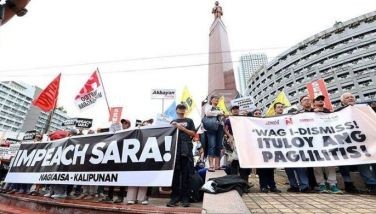RP near bottom in economic risk
February 14, 2007 | 12:00am
SINGAPORE – The Philippines ranked near bottom in a survey that rates Asian countries in terms of economic risk, lower than Thailand which is undergoing transition after the ouster of its prime minister in a coup.
The Political and Economic Risk Consultancy (PERC) said in its latest survey of expatriate business executives that the Philippines ranked third from last, ahead of India and Indonesia where investments were most at risk.
The survey measured risks relating to domestic politics, social instability, institutions, human resources, physical factors and external developments to get an average overall ranking.
Risks are rising sharply in Thailand, says the PERC survey which rates Singapore as Asia’s least risky economy.
"Risks are rising sharply in Thailand as a result of the continuing domestic political problems and the possibility of social unrest," PERC said, adding that "conditions could deteriorate in 2007."
Thailand’s military ousted the elected prime minister Thaksin Shinawatra in a bloodless coup last September. The junta has promised to hold elections and a return to democracy by the end of this year.
Of the 14 societies surveyed by PERC, "Thailand is the one that foreign investors should perhaps monitor most closely in the months ahead for changes that could affect business risks," it said.
Thailand’s recent moves to impose currency controls and limit foreign stakes in Thai companies have shocked foreign traders and business people.
In a best-to-worst ranking from zero to 10, Singapore got an overall score of 2.74, beating Japan which was in second place with a grade of 3.13, PERC said in the survey obtained by AFP.
Singapore’s score was slightly lower than Australia’s 2.69 but better than that of the United States at 3.15. Australia and the United States were included in the Asian survey as a basis for comparison, PERC said.
Excluding those two nations, Hong Kong came in third after Japan with a score of 3.33, followed by Malaysia at 4.66, Taiwan at 4.76, South Korea at 4.78 and Vietnam at 5.36.
China was in eighth place with a grade of 5.44, followed by Thailand at 5.49, the Philippines at 5.74, India at 6.24 and Indonesia at 6.79.
While Singapore retained the overall lead, perceptions of the domestic political situation "worsened slightly" from five years ago and threats from external risks saw a "big" rise, PERC said.
The increasing vulnerability to external developments is a result of more Singapore companies expanding overseas where risks are much higher and beyond the control of the government to manage, PERC said.
"As can be seen in the case of Temasek’s investment in Shin Corp. in Thailand, these investments potentially expose Singapore to new economic and diplomatic problems," the Hong Kong-based consultancy said.
State-linked investment firm Temasek Holdings last year bought Thai telecom giant Shin Corp. from the family of then prime minister Thaksin. The tax-free deal sparked massive rallies against Thaksin that culminated in his ouster.
Singapore was in fourth place behind Japan, Australia and Hong Kong in the variable measuring social instability risks and was in 10th place when measured against external political risks.
PERC said that while Indonesia received the worst score overall, "perceptions have improved considerably over the past five years" due to improvements in domestic political and social disorder risks.
It said the main problem in Indonesia is that "its key institutions are weak, while its physical and human infrastructure is poor."
Among Asia’s developed countries, the risks are highest in South Korea largely due to problems related to the Stalinist North, PERC said.
For China, Vietnam and India, some of the biggest risks are pollution and infrastructure deficiencies, it said.
"The more that sustainability issues are ignored or misjudged, the bigger the danger that bottlenecks will develop that seriously interfere with the economy and possibly disrupt social and political conditions as well," it warned.
The Political and Economic Risk Consultancy (PERC) said in its latest survey of expatriate business executives that the Philippines ranked third from last, ahead of India and Indonesia where investments were most at risk.
The survey measured risks relating to domestic politics, social instability, institutions, human resources, physical factors and external developments to get an average overall ranking.
Risks are rising sharply in Thailand, says the PERC survey which rates Singapore as Asia’s least risky economy.
"Risks are rising sharply in Thailand as a result of the continuing domestic political problems and the possibility of social unrest," PERC said, adding that "conditions could deteriorate in 2007."
Thailand’s military ousted the elected prime minister Thaksin Shinawatra in a bloodless coup last September. The junta has promised to hold elections and a return to democracy by the end of this year.
Of the 14 societies surveyed by PERC, "Thailand is the one that foreign investors should perhaps monitor most closely in the months ahead for changes that could affect business risks," it said.
Thailand’s recent moves to impose currency controls and limit foreign stakes in Thai companies have shocked foreign traders and business people.
In a best-to-worst ranking from zero to 10, Singapore got an overall score of 2.74, beating Japan which was in second place with a grade of 3.13, PERC said in the survey obtained by AFP.
Singapore’s score was slightly lower than Australia’s 2.69 but better than that of the United States at 3.15. Australia and the United States were included in the Asian survey as a basis for comparison, PERC said.
Excluding those two nations, Hong Kong came in third after Japan with a score of 3.33, followed by Malaysia at 4.66, Taiwan at 4.76, South Korea at 4.78 and Vietnam at 5.36.
China was in eighth place with a grade of 5.44, followed by Thailand at 5.49, the Philippines at 5.74, India at 6.24 and Indonesia at 6.79.
While Singapore retained the overall lead, perceptions of the domestic political situation "worsened slightly" from five years ago and threats from external risks saw a "big" rise, PERC said.
The increasing vulnerability to external developments is a result of more Singapore companies expanding overseas where risks are much higher and beyond the control of the government to manage, PERC said.
"As can be seen in the case of Temasek’s investment in Shin Corp. in Thailand, these investments potentially expose Singapore to new economic and diplomatic problems," the Hong Kong-based consultancy said.
State-linked investment firm Temasek Holdings last year bought Thai telecom giant Shin Corp. from the family of then prime minister Thaksin. The tax-free deal sparked massive rallies against Thaksin that culminated in his ouster.
Singapore was in fourth place behind Japan, Australia and Hong Kong in the variable measuring social instability risks and was in 10th place when measured against external political risks.
PERC said that while Indonesia received the worst score overall, "perceptions have improved considerably over the past five years" due to improvements in domestic political and social disorder risks.
It said the main problem in Indonesia is that "its key institutions are weak, while its physical and human infrastructure is poor."
Among Asia’s developed countries, the risks are highest in South Korea largely due to problems related to the Stalinist North, PERC said.
For China, Vietnam and India, some of the biggest risks are pollution and infrastructure deficiencies, it said.
"The more that sustainability issues are ignored or misjudged, the bigger the danger that bottlenecks will develop that seriously interfere with the economy and possibly disrupt social and political conditions as well," it warned.
BrandSpace Articles
<
>
- Latest
- Trending
Trending
Latest
Trending
Latest
Recommended






























